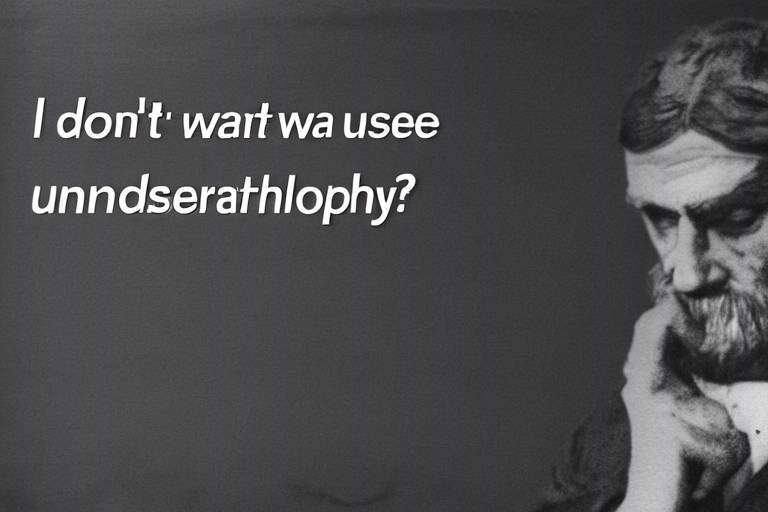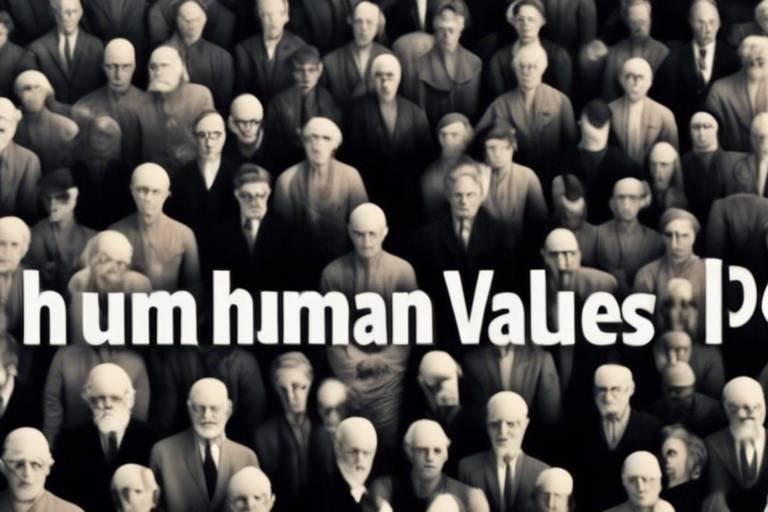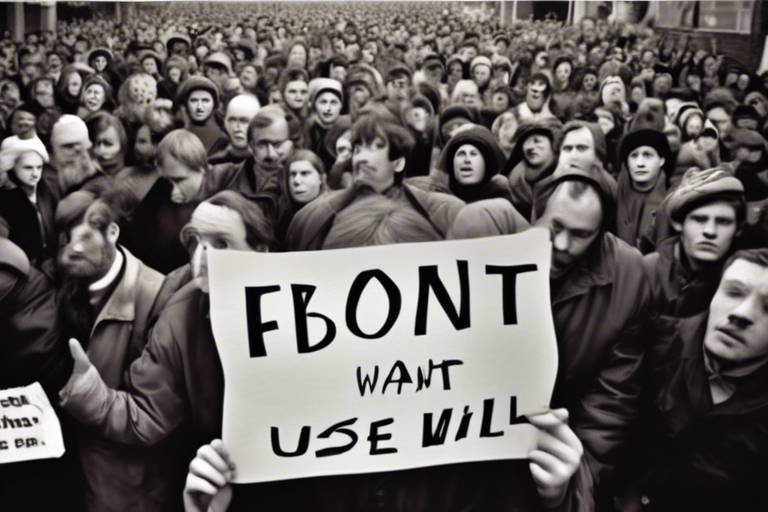Freedom in the Philosophy of Jean-Paul Sartre
Jean-Paul Sartre, a towering figure in 20th-century philosophy, revolutionized our understanding of freedom, embedding it deeply within the fabric of existentialism. His assertion that "existence precedes essence" serves as a pivotal starting point, suggesting that humans are not born with a predetermined purpose but instead forge their own paths through choices. This radical notion of freedom not only emphasizes the importance of individual agency but also underscores the profound responsibility that accompanies it. In a world where we often feel constrained by societal norms and expectations, Sartre's philosophy invites us to reclaim our autonomy and recognize the power of our decisions.
At the heart of Sartre's existentialism lies the idea that freedom is not merely the ability to make choices; it is the very essence of what it means to be human. Imagine standing at a crossroads, where each path represents a different potential future. This metaphor encapsulates Sartre's view: each choice we make shapes our identity and our reality. The weight of this freedom can be exhilarating, but it can also be terrifying. How often do we find ourselves paralyzed by the fear of making the wrong choice? Sartre encourages us to embrace this fear, suggesting that it is through our struggles with freedom that we truly come to understand ourselves.
Moreover, Sartre's exploration of freedom extends beyond the individual. He delves into the intricate web of human relationships, emphasizing that our freedom is interwoven with the freedom of others. Picture a dance: each partner must respect the other's movements while expressing their own. In this way, Sartre illustrates the delicate balance between personal autonomy and social responsibility. As we navigate our relationships, we must grapple with the tension that arises when our desires clash with those of others, ultimately leading us to a deeper understanding of both ourselves and our interconnectedness.
In contemporary discourse, Sartre's ideas on freedom resonate strongly, especially in discussions surrounding ethics, politics, and social justice. His assertion that we are "condemned to be free" serves as a powerful reminder that with freedom comes the burden of choice. We cannot escape the consequences of our actions, and this accountability is what shapes our moral landscape. In a world rife with injustices, Sartre's call for collective responsibility urges us to act not just for ourselves but for the greater good.
As we reflect on Sartre's philosophy, we are reminded that freedom is not a destination but a journey. It challenges us to confront our fears, embrace our responsibilities, and engage with the world around us. In doing so, we not only honor our own freedom but also the freedom of others, creating a more authentic and ethical existence. So, as we navigate the complexities of life, let us carry Sartre's insights with us, empowering ourselves to make choices that reflect our true selves and contribute to a more just society.
- What is existentialism? Existentialism is a philosophical movement that emphasizes individual existence, freedom, and choice, asserting that humans define their own meaning in life.
- How does Sartre define freedom? Sartre defines freedom as the fundamental essence of human existence, where individuals are responsible for their choices and the consequences that follow.
- What is 'bad faith' in Sartre's philosophy? 'Bad faith' refers to the act of self-deception, where individuals deny their freedom and responsibility by lying to themselves about their choices.
- Why is authenticity important in Sartre's thought? Authenticity is crucial because it involves recognizing one's freedom and responsibility, leading to genuine self-awareness and ethical living.
- How do Sartre's ideas apply to social responsibility? Sartre argues that true freedom includes recognizing our interconnectedness with others and the ethical implications of our actions on society.

The Essence of Existential Freedom
Jean-Paul Sartre's philosophy is a deep dive into the ocean of existential freedom, where he asserts that freedom is not just a luxury; it's the very essence of what it means to be human. Imagine standing at a crossroads, where every path you choose shapes not just your journey but your identity as well. Sartre argues that each individual is thrust into the world without a predetermined essence, making the act of choice fundamental to our existence. This notion of freedom is liberating yet daunting, as it places the weight of responsibility squarely on our shoulders. We are not merely products of our circumstances; we are the architects of our own lives.
In this existential framework, freedom is intricately linked to individual choice and responsibility. Sartre famously stated, "Existence precedes essence," which means that we are not defined by any external labels or roles until we choose to define ourselves. This idea can be both exhilarating and terrifying. Think about it: every decision we make, whether big or small, reflects our values, beliefs, and ultimately, our essence. The freedom to choose is a double-edged sword; it can lead to personal growth and fulfillment or to confusion and despair if we shy away from making authentic choices.
Moreover, Sartre emphasizes that this freedom is not an isolated phenomenon. It unfolds in the context of our relationships with others. When we make choices, we do so not only for ourselves but also in relation to those around us. This interconnectedness can enrich our lives but can also create tension, as our freedom may clash with the freedom of others. For instance, consider a scenario where one person’s decision to pursue a career abroad impacts their family’s dynamics. This interplay of freedoms highlights the complexity of human existence and the ethical implications of our choices.
To illustrate Sartre's concept of existential freedom further, let's consider a table that summarizes the core elements:
| Core Element | Description |
|---|---|
| Existence | The state of being alive and aware, where individuals are free to make choices. |
| Choice | The act of selecting from alternatives, which shapes identity and existence. |
| Responsibility | The obligation to acknowledge the consequences of one’s choices. |
| Interconnectedness | The relationship between individual freedom and the freedom of others. |
In essence, Sartre's exploration of freedom invites us to embrace the chaos of choice and the beauty of responsibility. It encourages us to reflect on how our decisions echo through our lives and the lives of those around us. So, the next time you're faced with a decision, remember that you hold the power to define your essence. Are you ready to take that leap into authentic existence?

Bad Faith and Self-Deception
In the realm of existentialism, bad faith is a fascinating yet troubling concept introduced by Jean-Paul Sartre. It serves as a lens through which we can examine how individuals often evade their inherent freedom and responsibility. But what exactly is bad faith? In simple terms, it’s a form of self-deception where a person denies their own freedom by lying to themselves. Imagine a bird trapped in a cage, convinced that the bars are a natural part of its existence, rather than a limitation imposed by external circumstances. This is the essence of bad faith—an individual choosing to ignore their ability to change their situation.
According to Sartre, bad faith manifests in various ways, often through the roles we play in society. For instance, consider a person who remains in a job they despise simply because it’s expected of them. They might tell themselves, “I have no choice; I need the money.” This reasoning is a classic example of bad faith. Instead of confronting the discomfort of their situation and recognizing their freedom to seek a different path, they choose to deceive themselves into believing that they are powerless. This self-deception not only leads to a lack of authenticity but also fosters a profound sense of disconnection from one’s true self.
To illustrate the concept further, let’s break down the implications of bad faith:
- Inauthenticity: Living in bad faith means living a lie, which ultimately leads to a dissonance between one’s actions and true desires.
- Denial of Responsibility: By evading the truth of their freedom, individuals often refuse to take responsibility for their choices, blaming external factors instead.
- Impact on Relationships: Bad faith can create barriers in interpersonal relationships, as individuals may project their self-deception onto others, leading to misunderstandings and conflicts.
Embracing authenticity, as Sartre suggests, requires a courageous confrontation with our choices. It’s about recognizing that we are not merely products of our environment or societal expectations, but rather active agents capable of shaping our destinies. This realization can be both liberating and terrifying. After all, with freedom comes the weight of responsibility. The moment we acknowledge our freedom, we also accept that we are accountable for our actions and their consequences.
In summary, bad faith is not just a philosophical concept; it’s a lived experience that many of us encounter. It reminds us that the struggle for authenticity is ongoing and that self-deception can be a tempting refuge from the complexities of life. By understanding and confronting our tendencies towards bad faith, we can begin to live more authentically, embracing both our freedom and the responsibilities that come with it.

bad faith
This article explores Jean-Paul Sartre's conception of freedom, examining its implications in existentialism, ethics, and human relationships, while highlighting its significance in contemporary philosophical discourse.
Sartre posits that freedom is the fundamental essence of human existence, emphasizing individual choice and responsibility as pivotal elements in shaping one's identity and life path.
The concept of is a fascinating yet troubling aspect of Sartre's philosophy. It serves as a lens through which we can examine how individuals often escape the burden of their freedom by engaging in self-deception. Imagine, for a moment, a person who is unhappy in their job but convinces themselves that they have no other options. This is a classic case of bad faith, where the individual lies to themselves, denying their freedom to choose a different path. Sartre argues that this self-deception leads to a life of inauthenticity, where one is merely existing rather than truly living.
In Sartre's view, bad faith is not just about lying to oneself; it is an act of evasion. People often create elaborate justifications for their choices, effectively shielding themselves from the harsh reality of their freedom. For instance, a student who blames their failure on an unfair professor, rather than acknowledging their lack of effort, is engaging in bad faith. This form of self-deception is not only damaging to the individual but also undermines the essence of personal responsibility.
Sartre argues that embracing authenticity requires acknowledging one’s freedom and the weight of responsibility that accompanies it, fostering genuine self-awareness and ethical living.
The act of making choices is central to Sartre's philosophy, where each decision reflects one's values and beliefs, ultimately defining one's essence and existence.
Sartre emphasizes that every choice carries consequences, reinforcing the idea that individuals must confront the outcomes of their actions and decisions.
Sartre explores how freedom manifests in relationships, highlighting the tension between individual freedom and the freedom of others, which can lead to conflict or mutual understanding.
Sartre's philosophy extends to social contexts, where he argues that true freedom involves recognizing the interconnectedness of individuals and the ethical implications of one’s actions on society.
The presence of others shapes our understanding of freedom, as interpersonal dynamics can either enhance or restrict individual liberty, influencing personal identity and ethical considerations.
Sartre's ideas on freedom extend to political realms, advocating for social justice and collective responsibility as essential components of a truly free society.
- What is bad faith in Sartre's philosophy?
Bad faith refers to the act of self-deception where individuals deny their freedom and responsibility by lying to themselves about their choices. - How does bad faith affect personal responsibility?
Engaging in bad faith leads to inauthenticity, as individuals evade the consequences of their actions, ultimately undermining their personal responsibility. - Can bad faith be overcome?
Yes, by embracing authenticity and acknowledging one's freedom, individuals can confront their choices and live more genuinely.

illustrates how individuals evade their freedom by lying to themselves, leading to inauthenticity and a denial of personal responsibility for their choices.
This article explores Jean-Paul Sartre's conception of freedom, examining its implications in existentialism, ethics, and human relationships, while highlighting its significance in contemporary philosophical discourse.
Sartre posits that freedom is the fundamental essence of human existence, emphasizing individual choice and responsibility as pivotal elements in shaping one's identity and life path.
The concept of bad faith illustrates how individuals evade their freedom by lying to themselves, leading to inauthenticity and a denial of personal responsibility for their choices. Imagine standing at a crossroads, with a multitude of paths laid out before you. Each path represents a choice, a decision that could alter the course of your life. However, many people choose to ignore this reality. They convince themselves that they are merely products of their circumstances, trapped by fate or the expectations of others. This self-deception is not just a casual lie; it is a profound evasion of the freedom that Sartre insists is intrinsic to our existence.
In essence, bad faith is like wearing a mask that obscures one’s true self. While it might provide temporary comfort or a sense of security, it ultimately leads to a life devoid of authenticity. When individuals deny their freedom, they also deny their ability to shape their own identities. This results in a disconnection from their true desires and values, leaving them trapped in a cycle of inauthenticity.
To further understand this concept, consider the following key points:
- Self-Deception: Individuals often convince themselves that they have no choice, which allows them to escape the burden of responsibility.
- Inauthenticity: Living in bad faith leads to a life that is not true to oneself, creating a façade that disconnects one from genuine feelings and desires.
- Denial of Responsibility: By attributing their choices to external forces, individuals relinquish their accountability and the power to change their circumstances.
Ultimately, Sartre challenges us to confront our freedom head-on. He argues that embracing our freedom is not just about making choices; it is about acknowledging the weight of those choices and the responsibility that comes with them. Only by doing so can we begin to live authentically, fully aware of our potential to shape our lives and the world around us.
Sartre argues that embracing authenticity requires acknowledging one’s freedom and the weight of responsibility that accompanies it, fostering genuine self-awareness and ethical living.
The act of making choices is central to Sartre's philosophy, where each decision reflects one's values and beliefs, ultimately defining one's essence and existence.
Sartre emphasizes that every choice carries consequences, reinforcing the idea that individuals must confront the outcomes of their actions and decisions.
Sartre explores how freedom manifests in relationships, highlighting the tension between individual freedom and the freedom of others, which can lead to conflict or mutual understanding.
Sartre's philosophy extends to social contexts, where he argues that true freedom involves recognizing the interconnectedness of individuals and the ethical implications of one’s actions on society.
The presence of others shapes our understanding of freedom, as interpersonal dynamics can either enhance or restrict individual liberty, influencing personal identity and ethical considerations.
Sartre's ideas on freedom extend to political realms, advocating for social justice and collective responsibility as essential components of a truly free society.
- What is bad faith in Sartre's philosophy? Bad faith is a form of self-deception where individuals deny their freedom and responsibility by lying to themselves.
- How does Sartre define freedom? For Sartre, freedom is the ability to make choices and take responsibility for those choices, shaping one's identity and existence.
- Why is authenticity important in existentialism? Authenticity is crucial as it represents living in accordance with one's true self, acknowledging freedom and responsibility.
- How does Sartre's concept of freedom relate to social responsibility? Sartre believes that true freedom involves understanding the interconnectedness of individuals and the impact of one's actions on society.

Authenticity and Responsibility
In the realm of existentialism, authenticity is not just a buzzword; it's a profound commitment to living in accordance with one's true self. Jean-Paul Sartre emphasizes that to be authentic is to fully acknowledge our freedom and the weighty responsibility that accompanies it. Imagine standing at a crossroads, where each path represents a different choice, a different life. The freedom to choose is exhilarating, yet it also comes with the burden of knowing that each decision shapes our identity and future.
Sartre argues that embracing authenticity means rejecting the comforting lies we often tell ourselves. It's easy to slip into a state of bad faith, where we convince ourselves that our choices are dictated by external circumstances or societal expectations. For example, one might say, "I have to take this job because I need the money," while ignoring the fact that they could explore other options. This self-deception leads to a life that feels hollow and unfulfilled. Instead, Sartre urges us to confront our choices head-on, understanding that we are the architects of our own lives.
Moreover, authenticity is intertwined with the concept of responsibility. When we acknowledge our freedom, we must also accept the consequences of our actions. This means recognizing that our choices not only affect us but also ripple out to influence others. For instance, if one chooses to act selfishly in a relationship, the fallout can lead to hurt feelings and broken trust. Thus, living authentically requires a deep sense of awareness about how our decisions impact the people around us.
To illustrate this, consider the following table that outlines the relationship between authenticity, responsibility, and the consequences of our choices:
| Aspect | Description |
|---|---|
| Authenticity | Living in alignment with one's true self and values. |
| Responsibility | Understanding that choices have consequences that affect oneself and others. |
| Consequences | The outcomes of our decisions that shape our lives and relationships. |
Ultimately, Sartre's philosophy teaches us that authenticity is not a destination but a continuous journey. It requires constant reflection and a willingness to face uncomfortable truths about ourselves. By embracing our freedom and the responsibility that comes with it, we can foster a life that is not only genuine but also ethically sound. In a world that often pressures us to conform, choosing authenticity can be an act of rebellion, paving the way for deeper connections and a more meaningful existence.
- What is the significance of authenticity in Sartre's philosophy?
Authenticity is crucial in Sartre's philosophy as it represents the commitment to live true to oneself and acknowledge one's freedom and responsibility. - How does bad faith relate to authenticity?
Bad faith involves self-deception and evading responsibility, which contrasts sharply with the idea of living authentically. - Why is responsibility important in the context of freedom?
Responsibility is essential because it reminds us that our choices have consequences, not just for ourselves but for others as well.

Existential Choice
In the realm of existentialism, the concept of choice is not just a matter of preference; it is the very essence of what it means to be human. Jean-Paul Sartre famously proclaimed that "existence precedes essence," which means that we are not born with a predetermined purpose or identity. Instead, we are defined by the choices we make throughout our lives. This idea can be both liberating and daunting, as it places the weight of our existence squarely on our shoulders. Every decision we make, from the mundane to the monumental, contributes to the tapestry of our identity, weaving together our past, present, and future.
Consider the metaphor of a blank canvas. When an artist begins to paint, they have the freedom to choose colors, shapes, and forms. Each brushstroke is a decision that shapes the final masterpiece. Similarly, our lives are like that canvas, where each choice we make adds depth and meaning to our existence. However, just as an artist must confront the reality of their creation, we too must face the consequences of our choices. Sartre emphasizes that we cannot escape the responsibility that accompanies our freedom; to do so is to live in bad faith, denying our authentic selves.
Moreover, Sartre's philosophy encourages us to recognize that our choices are not made in isolation. The act of choosing is inherently social, as our decisions often impact others and are influenced by the context in which we find ourselves. For instance, when choosing a career path, one might consider not only personal aspirations but also the expectations and needs of family, friends, and society. This interconnectedness adds another layer of complexity to our existential choices, reminding us that while we have the freedom to choose, we also navigate a web of relationships that can shape and sometimes constrain our options.
To illustrate this further, let’s consider a few examples of existential choices:
| Choice | Implications |
|---|---|
| Choosing a career | Influences personal fulfillment, financial stability, and social status. |
| Entering a relationship | Affects emotional well-being and interpersonal dynamics. |
| Relocating to a new city | Changes social circles and lifestyle, impacting personal growth. |
Ultimately, Sartre's view of existential choice serves as a powerful reminder that we are the architects of our own lives. Each choice is an opportunity to assert our freedom and embrace our authentic selves. However, with this freedom comes the responsibility to reflect on our decisions and their consequences. Are we making choices that align with our true values, or are we succumbing to external pressures and societal expectations? This introspection is crucial in fostering a life of authenticity and purpose.
- What does Sartre mean by "existence precedes essence"? This phrase indicates that individuals are not born with a predetermined purpose; rather, they create their own essence through choices and actions.
- How does Sartre's concept of freedom relate to responsibility? Sartre believes that with freedom comes the responsibility to make choices that reflect one's true self, as avoiding this responsibility leads to inauthenticity.
- Can existential choices be influenced by others? Yes, our choices are often shaped by social contexts, relationships, and external expectations, highlighting the interconnected nature of freedom.

Consequences of Choices
In the realm of Sartre's philosophy, the notion of choice is not merely a casual decision made on a whim; rather, it serves as a profound reflection of our values and beliefs. Every choice we make is a stepping stone that shapes our identity and existence. Think of it as a fork in the road: each path we take leads us to a different destination, influencing not only our personal journey but also the lives of those around us. Sartre emphasizes that we are not just passive observers in our lives; we are active participants, sculpting our reality through our decisions.
When we make a choice, we must confront the consequences that follow. These consequences can be immediate or far-reaching, impacting our future and the lives of others. For instance, consider a simple decision like choosing a career path. This choice does not solely affect your life; it can ripple through your family, friends, and even your community. The weight of this responsibility can be daunting, yet it is essential for fostering a sense of authenticity in our lives.
Moreover, Sartre's philosophy encourages us to embrace the reality that our choices carry moral implications. When we opt for one course of action over another, we are implicitly endorsing certain values while rejecting others. This principle can be illustrated through a few key points:
- Personal Responsibility: Each choice reflects our commitment to our values, and we must own the outcomes.
- Impact on Others: Our decisions can have significant repercussions on the lives of those around us.
- Reflection of Self: Choices reveal our true selves, acting as mirrors that reflect our beliefs and priorities.
To further illustrate this concept, let's consider a table that summarizes the potential consequences of various choices:
| Choice | Immediate Consequence | Long-term Consequence |
|---|---|---|
| Choosing a Career | Job Satisfaction | Financial Stability |
| Ending a Relationship | Emotional Relief | Loneliness or Growth |
| Moving to a New City | New Experiences | Building New Connections |
Ultimately, Sartre's assertion that we are condemned to be free serves as a reminder that our choices are inextricably linked to our essence. We cannot escape the responsibility that comes with our decisions, nor can we ignore the impact they have on our lives and the lives of others. By acknowledging and embracing the consequences of our choices, we cultivate a deeper sense of self-awareness and authenticity, allowing us to navigate the complexities of existence with greater clarity and purpose.
What does Sartre mean by "we are condemned to be free"?
Sartre's phrase suggests that freedom is an inescapable aspect of human existence. We are always faced with choices, and with those choices comes the weight of responsibility.
How do choices reflect our identity?
The decisions we make are a direct reflection of our values, beliefs, and priorities. They shape our identity and influence how we perceive ourselves and how others perceive us.
Can we avoid the consequences of our choices?
No, according to Sartre. Every choice carries consequences, and it's essential to confront and accept these outcomes as part of our journey towards authenticity.

Interpersonal Freedom
When we dive into the concept of , we're really examining the delicate dance between our own liberty and the freedoms of those around us. Sartre believed that our existence is intertwined with others, and this interconnectedness creates a unique landscape where freedom can flourish or falter. Imagine a tightrope walker balancing high above the ground; each step they take is a choice that affects not just their own stability but also the safety of those watching below. In relationships, just like in that balancing act, our decisions can either uplift or undermine the freedom of others.
One of the most striking aspects of Sartre's philosophy is the idea that while we are fundamentally free, our freedom is often challenged by the presence of others. This can lead to a paradox where our quest for independence might inadvertently impose limitations on someone else's freedom. For instance, consider a situation where one partner in a relationship seeks personal growth and exploration, but the other feels threatened by this change. This tension can create a conflict where both individuals struggle to assert their freedom while also respecting the other's desires and boundaries.
In this context, Sartre introduces the notion of the Other, which refers to other individuals who play a crucial role in shaping our identity and understanding of freedom. The presence of others can serve as a mirror, reflecting back our choices and values. However, this interaction can be a double-edged sword. On one hand, it can enhance our self-awareness and help us realize our potential. On the other, it can lead to feelings of alienation or resentment if we perceive that our freedom is being encroached upon.
To navigate this complex landscape, Sartre emphasizes the importance of communication and mutual respect. By openly discussing our needs and boundaries, we can foster an environment where both parties feel heard and valued. This process not only strengthens our relationships but also allows for a more profound understanding of what it means to be free in the presence of others. Ultimately, the goal is to cultivate a space where individual freedom and interpersonal dynamics coexist harmoniously, allowing for personal growth without sacrificing the well-being of others.
In summary, Sartre's exploration of interpersonal freedom reveals that our relationships are not merely about coexistence but about a shared journey towards authentic freedom. This journey requires us to confront the challenges posed by others while also embracing the opportunities for connection and understanding. The path may be fraught with difficulties, but it is through these interactions that we truly come to grasp the essence of freedom.
- What is interpersonal freedom according to Sartre?
Interpersonal freedom refers to the balance between individual liberty and the freedom of others, emphasizing the importance of mutual respect and communication in relationships. - How does Sartre's concept of the Other influence our freedom?
The presence of the Other helps shape our identity and understanding of freedom, reflecting our choices and values while also presenting challenges that can affect our sense of autonomy. - Can interpersonal freedom lead to conflict?
Yes, the pursuit of personal freedom can sometimes conflict with the freedoms of others, leading to tensions that require careful navigation through communication and mutual respect. - What role does responsibility play in interpersonal freedom?
Responsibility is crucial as it involves acknowledging the impact of our choices on others, fostering a sense of ethical living and genuine self-awareness in our relationships.

Freedom and Social Responsibility
When we dive into the depths of Jean-Paul Sartre's philosophy, one of the most striking themes that emerges is the intricate relationship between freedom and social responsibility. Sartre challenges us to rethink what it means to be free, suggesting that true freedom is not merely the absence of constraints but rather an active engagement with the world around us. Imagine freedom as a vast ocean; it can be exhilarating, but without the right navigational skills, one can easily drift into perilous waters. In this context, freedom becomes a shared journey where our choices ripple out and affect others.
Sartre argues that our freedom is intertwined with the freedom of others, creating a complex web of interdependence. Just as a bird in flight relies on the currents of the wind, our individual liberties are shaped by the societal structures we inhabit. This means that every choice we make carries weight, not just for ourselves but for the collective. In essence, to act freely is to act responsibly, recognizing that our actions can uplift or hinder those around us.
Moreover, Sartre emphasizes that with freedom comes a profound ethical obligation. It’s not enough to simply pursue our own desires; we must also consider the impact of our actions on the community. This is where the concept of existential ethics comes into play. Sartre invites us to reflect on questions like: What kind of society do I want to create? and How do my choices contribute to the well-being of others? By engaging with these questions, we cultivate a sense of responsibility that transcends individualism.
To illustrate this point, let’s consider a few key aspects of how freedom and social responsibility intersect:
- Empathy and Understanding: Recognizing that others have their own freedoms and struggles fosters empathy. It encourages us to step into their shoes and understand their perspectives.
- Collective Action: True freedom often necessitates collaboration. When individuals come together for a common cause, they amplify their voices and create meaningful change.
- Ethical Decision-Making: Every choice we make should be weighed against its potential impact on society. This means considering not just what is best for us, but what is right for the community.
The implications of Sartre's philosophy extend beyond personal choices; they challenge us to engage in social activism and advocate for justice. In a world where inequality and oppression persist, the call for social responsibility becomes even more urgent. Sartre’s existentialism urges us to confront these issues head-on, reminding us that our freedom is most potent when it is used to uplift others.
In conclusion, Sartre’s exploration of freedom and social responsibility invites us to embrace our roles as active participants in society. By understanding that our freedom is interconnected with the freedoms of others, we can cultivate a more just and equitable world. So, the next time you ponder your own freedom, ask yourself: How can I use my choices to foster a better society?
- What is the main idea of Sartre's philosophy regarding freedom?
Sartre believes that freedom is the essence of human existence and that individuals are responsible for their choices and the consequences that follow. - How does Sartre define social responsibility?
He argues that social responsibility is recognizing the interconnectedness of individuals and understanding that our actions impact the community. - Why is empathy important in Sartre's view of freedom?
Empathy allows us to understand the experiences of others, fostering a sense of collective responsibility and ethical living. - What role does choice play in Sartre's philosophy?
Choice is central to Sartre's philosophy; every decision reflects our values and beliefs, shaping our identity and existence.

The Role of Others
In the intricate tapestry of our lives, the presence of others plays a pivotal role in shaping our understanding of freedom. Imagine freedom as a vast ocean; while we may feel like solitary boats navigating its waters, the currents created by other vessels—our relationships, interactions, and societal influences—can either propel us forward or create turbulent waves that challenge our autonomy. Sartre emphasizes that our freedom is not merely an isolated phenomenon; it is deeply intertwined with the freedom of those around us. This interdependence can lead to a rich tapestry of mutual understanding and support, or it can spark conflict when individual freedoms clash.
When we engage with others, we often find ourselves negotiating our desires and aspirations against the backdrop of societal norms and expectations. For instance, consider how family dynamics can influence personal choices. The desire to pursue a dream career might be hindered by familial obligations or cultural expectations. This tension illustrates that while we strive for personal freedom, we must also navigate the complex web of relationships that can either facilitate or restrict our choices. Sartre's notion of “the look” encapsulates this idea, where the gaze of another person can affirm or deny our sense of self, highlighting the dual nature of freedom in interpersonal relationships.
Furthermore, our interactions with others often serve as mirrors reflecting our own values and beliefs. In a sense, the people we surround ourselves with can either challenge us to grow or reinforce our existing views. This dynamic can be both liberating and constraining. For example, if you’re part of a group that encourages open-mindedness and exploration, you may feel empowered to express your true self. Conversely, if your social circle is rooted in rigid beliefs, you might find your freedom stifled. Thus, the role of others is a double-edged sword; they can either enhance our sense of authenticity or lead us into the shadows of conformity.
In Sartre's philosophy, the recognition of others is crucial for authentic existence. It’s not just about existing alongside others; it’s about understanding that our choices impact those around us. This interrelation demands a level of ethical consideration that transcends mere self-interest. For instance, when making decisions that could affect a community, such as environmental actions or social initiatives, one must consider the broader implications. The freedom to act comes with the responsibility to acknowledge how our actions reverberate through the lives of others.
To sum it up, the role of others in our quest for freedom is multifaceted. It can be a source of strength and support, or it can challenge our autonomy and provoke conflict. Ultimately, the interplay between individual freedom and the freedom of others underscores the essence of our shared humanity. By embracing this interconnectedness, we can navigate our paths with greater awareness and responsibility, enriching both our lives and the lives of those around us.
- What does Sartre mean by freedom?
Sartre defines freedom as the fundamental essence of human existence, emphasizing individual choice and responsibility in shaping one's identity. - How does bad faith relate to freedom?
Bad faith illustrates how individuals deceive themselves to evade their freedom, leading to inauthenticity and a denial of personal responsibility. - Can freedom exist without others?
Sartre argues that our freedom is intertwined with the freedom of others, making interpersonal relationships crucial to understanding and exercising our freedom. - What are the ethical implications of Sartre's philosophy?
Sartre's philosophy emphasizes the interconnectedness of individuals, suggesting that true freedom includes recognizing the impact of our actions on society.

Political Implications of Freedom
When we dive into the political implications of freedom as articulated by Jean-Paul Sartre, we uncover a rich tapestry of thought that intertwines personal liberty with social responsibility. Sartre believed that freedom is not merely an individual pursuit; rather, it exists within the context of our relationships with others and the society we inhabit. This perspective challenges us to think beyond our own desires and consider the broader impact of our actions on the collective.
One of Sartre's key assertions is that true freedom is inseparable from the concept of social justice. He argues that individuals cannot fully realize their freedom unless they acknowledge the freedoms of others. This idea can be likened to a dance; if one partner steps on the toes of the other, the entire performance is thrown off balance. In a political context, this means that the liberation of one group is intrinsically linked to the liberation of all. For Sartre, the fight for freedom must include the fight against oppression and inequality, emphasizing that freedom is a shared endeavor.
Moreover, Sartre's existentialism posits that each individual is responsible for their choices, and these choices have far-reaching implications. When individuals choose to remain passive in the face of injustice, they are, in essence, contributing to the perpetuation of that injustice. This notion is particularly relevant in today's political climate, where the choices made by citizens can either uphold or dismantle systems of power. Sartre's philosophy encourages active engagement in political discourse and action, urging individuals to take responsibility for the societal structures they inhabit.
To illustrate Sartre's views on the political implications of freedom, consider the following table that summarizes his key ideas:
| Concept | Description |
|---|---|
| Interconnectedness | Freedom is not isolated; it is linked to the freedom of others. |
| Social Justice | True freedom requires the fight against oppression and inequality. |
| Personal Responsibility | Individuals must acknowledge the impact of their choices on society. |
| Active Engagement | Citizens should participate in political action to foster genuine freedom. |
In addition, Sartre’s exploration of freedom extends into the realm of political activism. He believed that individuals have a moral obligation to challenge oppressive systems and advocate for the rights of others. This activism is not just a political duty; it is a manifestation of one's freedom. By standing up against injustice, individuals affirm their own freedom while also paving the way for the liberation of others.
Ultimately, Sartre's political implications of freedom resonate deeply in contemporary discussions about human rights, social movements, and the role of the individual in society. His philosophy urges us to recognize that our freedoms are intertwined with those of our neighbors, and that a truly free society is one where everyone has the opportunity to thrive. In a world that often feels divided, Sartre’s ideas remind us that our collective freedom hinges on our willingness to fight for each other, creating a more just and equitable society for all.
- What is Sartre's view on individual freedom?
Sartre believes that individual freedom is essential to human existence and is closely linked to personal responsibility. - How does Sartre define bad faith?
Bad faith is a form of self-deception where individuals avoid acknowledging their freedom and responsibility, leading to inauthenticity. - What role does authenticity play in Sartre's philosophy?
Authenticity involves embracing one's freedom and the responsibilities that come with it, leading to genuine self-awareness and ethical living. - How does Sartre's philosophy relate to social justice?
Sartre argues that true freedom cannot exist without social justice, as individual liberties are interconnected with the freedoms of others.
Frequently Asked Questions
- What is Sartre's view on freedom?
Sartre believes that freedom is the very essence of human existence. He argues that each individual has the ability to make choices, and these choices define who they are. It's all about taking responsibility for those choices and shaping your own identity.
- What does 'bad faith' mean in Sartre's philosophy?
'Bad faith' refers to the act of self-deception, where individuals deny their own freedom and responsibility. Instead of facing the reality of their choices, they lie to themselves, leading to a life that is inauthentic and disconnected from their true selves.
- How does Sartre connect authenticity with responsibility?
Sartre argues that to live authentically, one must acknowledge their freedom and the accompanying responsibility. This means being self-aware and making choices that align with one's true values, rather than conforming to societal expectations or escaping from personal accountability.
- What role do choices play in Sartre's existentialism?
In Sartre's existentialism, choices are central. Every decision you make reflects your beliefs and values, effectively defining your essence. It's a constant reminder that you have the power to shape your life through your choices.
- What are the consequences of our choices according to Sartre?
Sartre emphasizes that every choice comes with consequences. This highlights the importance of being mindful of your actions, as you must confront the outcomes of your decisions and take responsibility for them.
- How does freedom manifest in interpersonal relationships?
Sartre explores the tension between individual freedom and the freedom of others in relationships. This dynamic can lead to conflicts or, conversely, a deeper mutual understanding, showcasing the complexity of human interactions.
- What is the relationship between freedom and social responsibility in Sartre's philosophy?
Sartre extends the concept of freedom to social contexts, arguing that true freedom involves recognizing how our actions impact others. It calls for a collective sense of responsibility and ethical consideration in our interactions within society.
- How do others influence our understanding of freedom?
The presence of others plays a crucial role in shaping our perception of freedom. Interpersonal dynamics can either enhance or restrict our liberty, influencing how we view our own identity and ethical responsibilities.
- What are the political implications of Sartre's ideas on freedom?
Sartre's philosophy advocates for social justice and collective responsibility. He believes that a truly free society must address the interconnectedness of individuals and work towards ensuring that freedom is accessible to all.



















